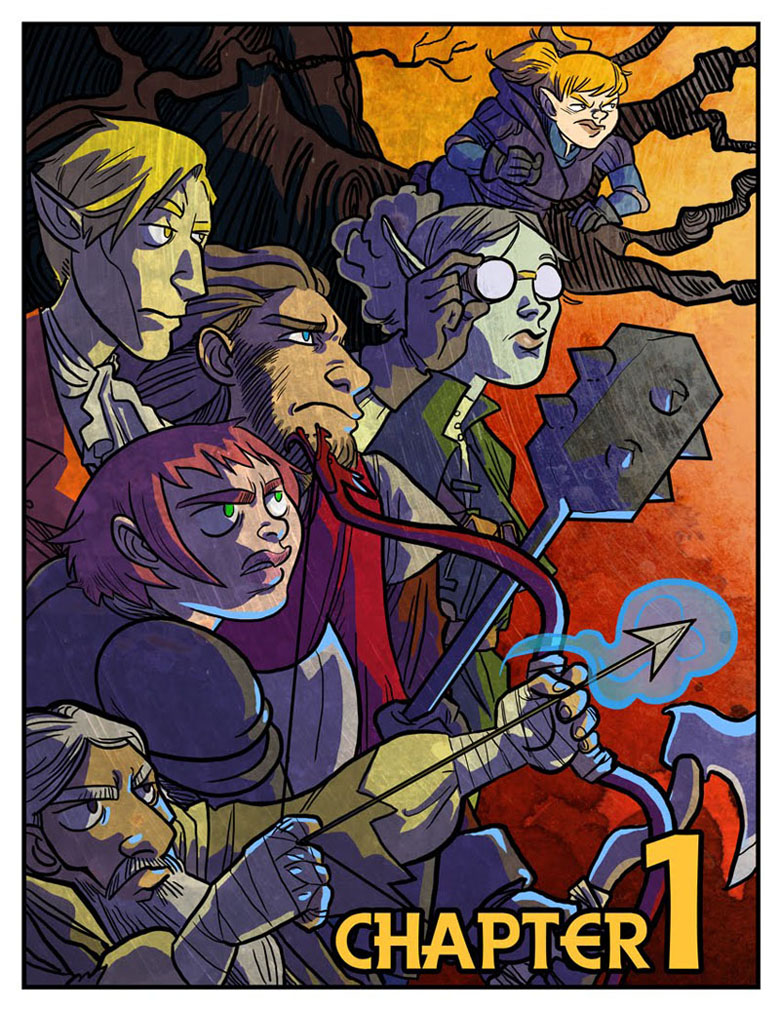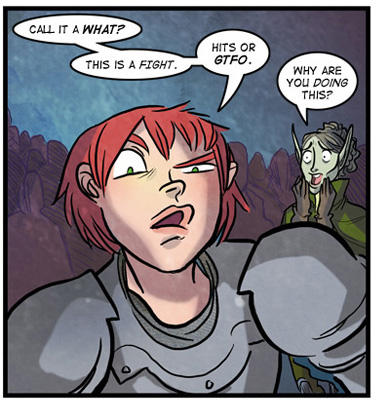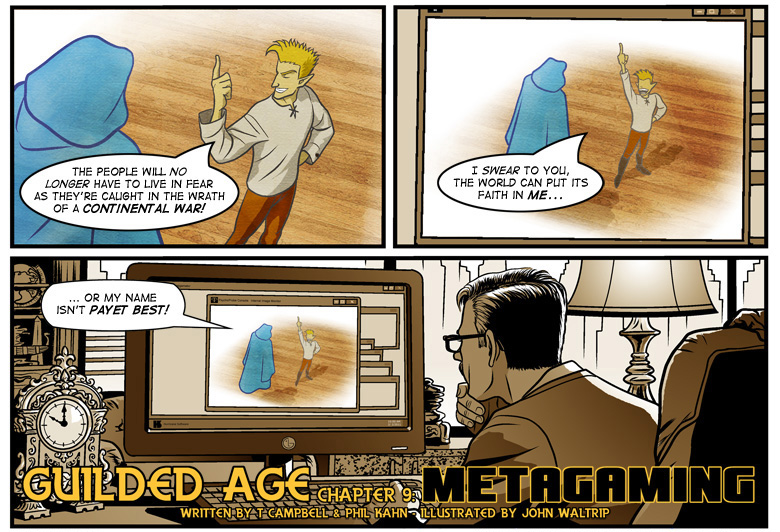The land of Arkerra is in turmoil. The trolls, goblins, gnolls and other ”savage races” have banded against the human empire of Gastonia and their allies. It is up to a band of working adventurers to keep the peace. Can the Peacekeepers –Byron Hackenslasher the human berserker, Syr’nj the scientifically-minded tree elf, Frigg Akerfeldt the foul-mouthed warrior, Gravedust Deserthammer the dwarvan mystic, Payet Best the obnoxious elven musician, and Bandit Keynes the gnome thief – come together and save their world? And is their world the only one in danger?
Guilded Age is a fantasy webcomic written by T. Campbell (webcomic veteran of Penny and Aggie and Fans) and Phil Kahn. The first seven chapters are drawn by Erica Henderson (you might now know her for her work on Squirrel Girl and Jughead) before John Waltrip takes over as artist. Guilded Age tells the story of seven adventurers. It wisely splits its beginning chapters between the present story of the already-established team on missions, and the story of how they came together. It’s a “have your cake and eat it too” beginning, where you get to see all the introductions without waiting around for the fun to start. Early on, Guilded Age seems like a very standard fantasy comic playing with familiar tropes. It pulls specifically from D&D and MMORPG culture. You probably guessed this reading the cast descriptors “Human Berserker” and “Dwarf Mystic.” The comic leans into this, Frigg especially reads like a specific type of gamer, saying things like “Hits or GTFO.”
RPG inspired comics are a fairly popular genre in webcomics. Comics like Goblins, Order of the Stick, Erfworld, Darken, and Cucumber Quest are all tied into gaming tropes. They all have varying levels of “meta,” from Order of the Stick where characters will state “I failed my Bardic Lore roll” or Darken, while inspired by a campaign, plays everything straight in-story. It makes perfect sense that RPG’s would inspire so many comics, as role-playing games are designed to simulate and gamify fiction. You can even hear Molly Ostertag talk about how the protagonist of Strong Female Character was somewhat inspired by a role-playing game here. From the beginning, Guilded Age plays with this. The jokiness of some elements (Syr’ng is their medic, Hakenslash is their berserker) contrasts with the growing depth of the characters and the world, specifically the complicated racial politics of the world. Then the comics relationship to “meta-ness” get a lot more complicated.
SPOILERS Y’ALL
In chapter 8, our adventurers are all seemingly killed. Then the camera pulls out to see someone watching Arkerra on a screen, someone in “our world.” That person is H.R. Dedalus, lead designer of Hurricane Software’s MMORPG Kingdoms of Arkerra. It turns out six of the seven Peacekeepers are actually normal human gamers who got the chance to test out a new deep immersion gaming system, and have gone so deep they’ve forgotten their past lives and can not be woken up. What this means for Dedalus is that he has six missing persons in vats in his basement and a huge potential PR disaster. However, it turns out Dedalus has much bigger ambitions than dominating the world of gaming and this is all part of a larger plan. From chapter 9 on, the story is split into the Arkerra story and the “Real World” story.
Guilded Age successfully makes the audience care about the fantasy world it’s created (Who will win the war? What will happen to the “savage races?” Will the beserker plague be stopped?), and then pulls the rug out from under the audience by asking how real is this world. Even if Arkerra is in someway “real,” are our protagonists really “Byron,” “Frigg” and “Syr’nj”?
END SPOILERS
Guilded Age is a fun fantasy adventure that plays with familiar tropes and their relationship to rpgs to create a unique and interesting sci-fi/fantasy story. It updates reliably MWF.











It’s shit.
I like it.
And thus, the end of criticism.
To add some detail to my review: I like the long game story–not so much the meta-verse aspect, which I could take or leave, but the ongoing war between humans and other species. I appreciate the way the guild slowly rose to power with one faction, only to come up against corruption and decline, and look for another way out. I like the individual character arcs–the way Syr’nj has slowly become more and more comfortable in a leadership role, Frigg’s discomfort with being a potential spiritual figure, Byron’s redemption arc.
Granted, it has a habit of over-relying on its readers’ long memory (a link to exactly where a conversation that happened years ago but is immediately relevant to today’s plot would be nice thanks) and it’s not particularly breaking new ground with innovation. But it’s solid in its comedic beats, good at building its epic scale, and consistent in its publishing, which is more than you can say for most prose fantasy.
Comments are closed.